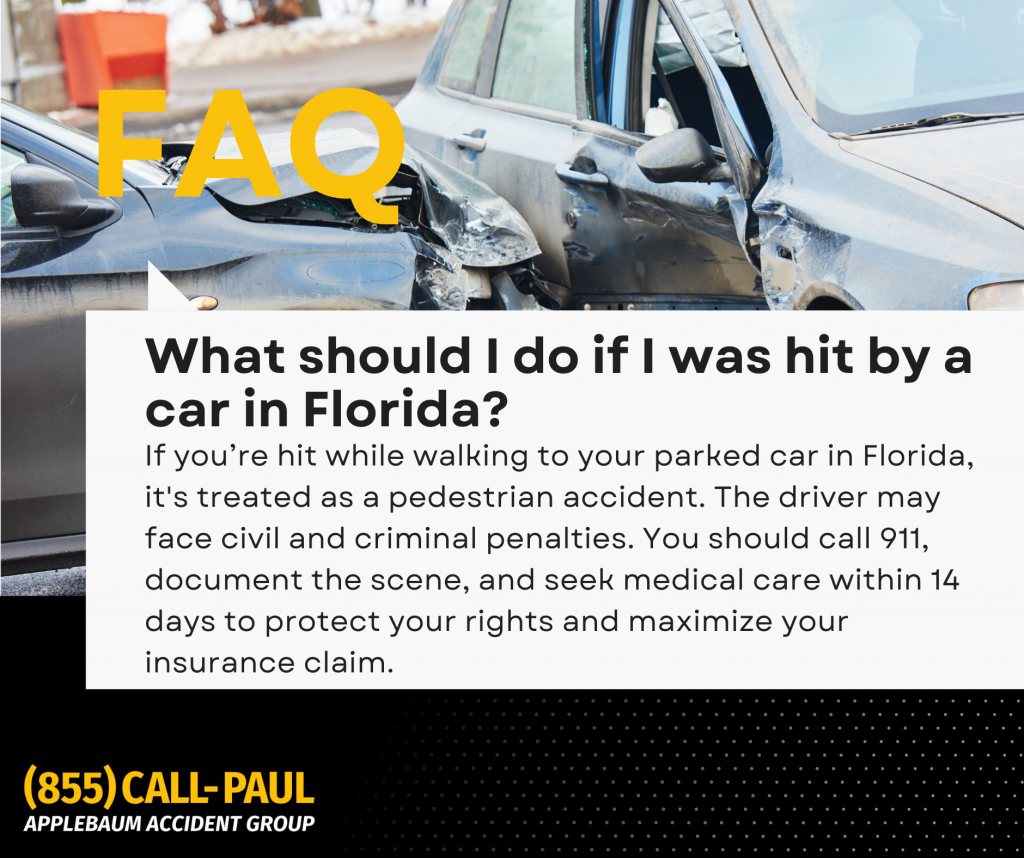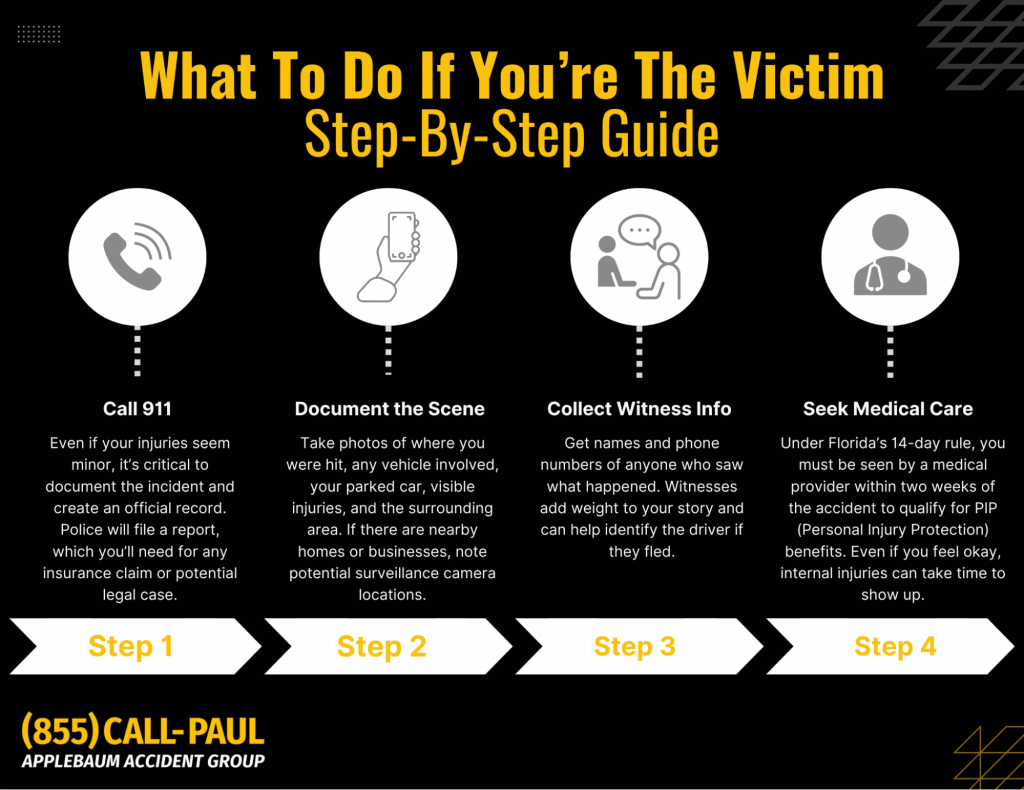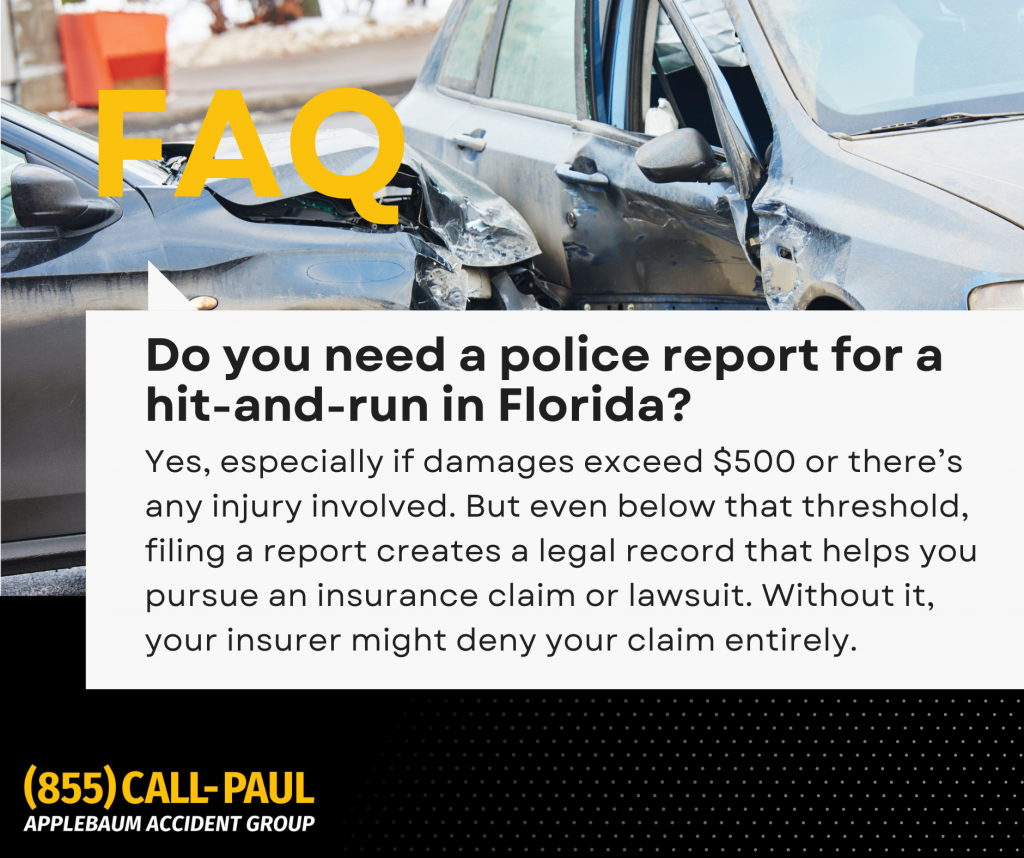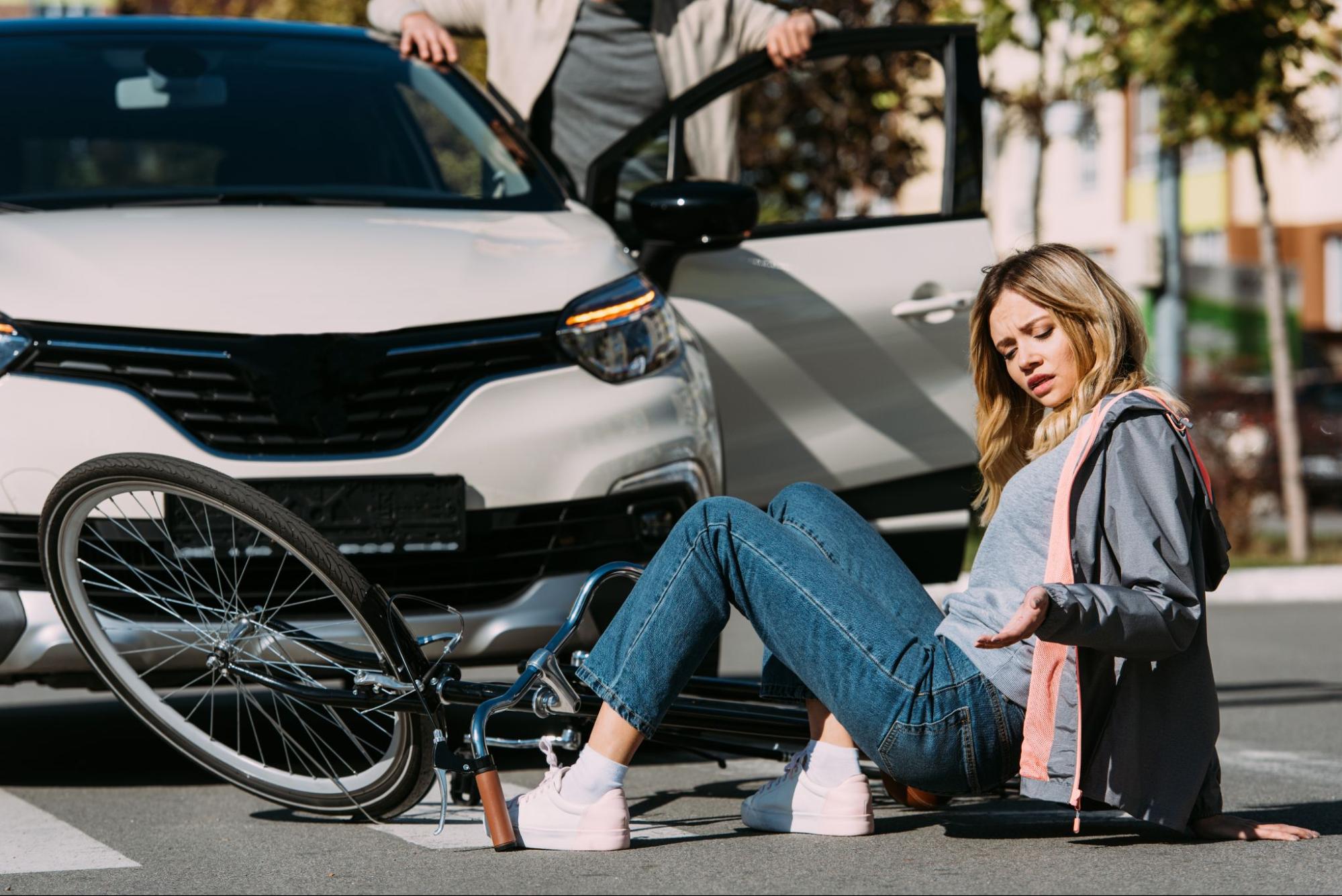If you’re hit while walking to your parked car in Florida, it’s treated as a pedestrian accident. The driver may face civil and criminal penalties. You should call 911, document the scene, and seek medical care within 14 days to protect your rights and maximize your insurance claim.

Whether you were unloading groceries or unlocking your car door, these accidents often happen in an instant, and in places most people assume are safe: apartment lots, school lanes, or curbside streets. If you’re hurt, confused, or unsure what to do next, you’re not alone.
Quick Facts: Hit While Walking to Your Parked Car
- You’re legally a pedestrian: even just steps from your vehicle
- Florida’s 14-Day Rule applies: see a doctor quickly to access PIP benefits
- Hit-and-run? Still report it: leaving the scene is a criminal offense
- Camera footage matters: nearby homes or businesses may hold crucial evidence
- Minor pain can signal major injuries: don’t assume you’re fine without a proper evaluation
This guide walks you through what to do in those chaotic first moments, what the law says, how to protect your medical rights, and when it’s time to get legal help.
Florida Law: Are You a Pedestrian or Not?
Under Florida law, the answer is clear: if you’re not inside your vehicle, you’re a pedestrian, even if you’re only a few feet away from opening the door.
Why does this matter? Because how the law classifies you plays a huge role in determining fault, insurance coverage, and potential criminal penalties for the driver. When a person is hit outside of a vehicle, the legal framework changes from a fender-bender to a pedestrian accident, often triggering more severe consequences.
Let’s say a driver strikes someone heading to their parked car. If there’s bodily injury, that can escalate the case from a simple insurance issue to a criminal matter. In some cases, drivers may face misdemeanor or even felony charges, depending on whether they fled the scene or caused injury.
What happens if you hit a pedestrian in Florida?
If you hit someone walking, even if they’re near their parked car, it can trigger charges ranging from failure to yield to vehicular assault, especially if there’s serious injury involved. And if you leave the scene without giving information? You’re now looking at potential jail time.
If You’re the Victim: Here’s Exactly What to Do

In the chaos after being struck, many people don’t know what steps to take. Others, especially young drivers, freeze or avoid acting because they’re afraid of getting in trouble or telling their parents. But delaying action can make everything worse.
Here’s what to do:
- Call 911 Immediately: Even if your injuries seem minor, it’s critical to document the incident and create an official record. Police will file a report, which you’ll need for any insurance claim or potential legal case.
- Document the Scene: Take photos of where you were hit, any vehicle involved, your parked car, visible injuries, and the surrounding area. If there are nearby homes or businesses, note potential surveillance camera locations.
- Collect Witness Info: Get names and phone numbers of anyone who saw what happened. Witnesses add weight to your story and can help identify the driver if they fled.
- Seek Medical Care Immediately: Under Florida’s 14-day rule, you must be seen by a medical provider within two weeks of the accident to qualify for PIP (Personal Injury Protection) benefits. Even if you feel okay, internal injuries can take time to show up.
- What If You’re Scared to Tell a Parent or Guardian? You’re not alone. Many younger victims are more anxious about parental backlash than their actual injury. But you can still file a claim even if the insurance policy isn’t in your name. If you’re a dependent under a family insurance plan, notify the policyholder or speak with a legal referral service like Applebaum Accident Group. They’ll guide you through it confidentially and compassionately.
What If the Driver Flees the Scene?
If someone hits you while you’re walking to your parked car and drives away, it’s not just wrong, it’s a hit-and-run. Under Florida law, leaving the scene of an accident without providing contact and insurance information is a criminal offense, even if the vehicle involved was parked and even if the injuries seem minor at first.
Florida classifies hit-and-runs based on the outcome of the incident:
- Property damage only: This is typically a first-degree misdemeanor and can lead to fines, license suspension, and up to one year in jail.
- Injury to a person: This becomes a felony of the second or third degree, depending on severity.
- Serious bodily injury or death: The stakes are even higher. Drivers may face felony charges punishable by long-term imprisonment.
Do You Need A Police Report For A Hit-And-Run In Florida?

Yes, especially if damages exceed $500 or there’s any injury involved. But even below that threshold, filing a report creates a legal record that helps you pursue an insurance claim or lawsuit. Without it, your insurer might deny your claim entirely.
So how do you track down a driver who’s already gone?
- Check for security cameras on nearby buildings, homes, or even school properties.
- Ask witnesses immediately for what they saw: car color, license plate digits, or direction of travel.
- Look for digital clues, like license plate recognition systems on nearby traffic lights or business security systems.
If You’re the Driver: What You Legally Must Do
Let’s flip the script: You’re driving, and you clip someone walking toward their parked car, or you accidentally hit the parked vehicle and no one is around. What are your obligations?
In Florida, you are legally required to stop and provide your name, address, and vehicle registration to the person involved or to law enforcement. Even if the damage seems minimal or the person insists they’re “fine,” walking away without reporting the incident can land you in serious legal trouble.
If there’s an injury and you fail to stop? You could face felony charges. And even without injury, failing to leave a note or report the accident is a misdemeanor. This applies even on private property like a school parking lot or apartment complex.
What Do You Do If You Hit A Parked Car And No One Is Around
You must attempt to locate the owner. If you can’t, leave a note in a clearly visible spot with your full contact details and a brief explanation. Then notify the local police department.
Too many drivers think that if the damage is small, it’s better to avoid reporting it. That decision often backfires, especially if someone catches the incident on camera or if the victim later reports it with photo evidence. You’re not just risking your insurance rates, you’re risking criminal charges.
Insurance Claims: What’s Covered and What’s Not
Accidents like these reveal a gap between what drivers think is covered and what actually is. Florida drivers often learn the hard way that not all policies are created equal, and that’s especially true when it comes to being hit as a pedestrian or during a hit-and-run.
Here’s how it typically breaks down:
- Uninsured Motorist (UM): This may cover your injuries if you’re hit by a driver who has no insurance or flees the scene.
- Uninsured Motorist Property Damage (UMPD): Many assume this applies to hit-and-run situations, but it often only kicks in if the driver is identified.
- Collision Coverage: This applies when your own vehicle is damaged, regardless of who was at fault. It’s usually more reliable in no-contact or unknown-driver scenarios.
- Comprehensive Coverage: Often confused with collision, but it only applies to non-accident events (like theft or weather damage).
Teen drivers, and even adults, often misunderstand which type of coverage protects them. Parents, too, sometimes think that because their child is listed on the policy, everything is automatically covered. That’s not always true.
Still confused about the difference between UM, UMPD, and PIP in Florida? This guide explains exactly what each one covers: What Is PIP And PDI Insurance Florida
Who’s at Fault, and Does It Matter?
Yes, fault matters in Florida, and it’s not always black and white. Florida follows the comparative negligence rule, which means each party involved in an accident can share a percentage of fault. Your financial recovery can be reduced by your portion of the blame.
Let’s say you were hit while walking between parked cars in a busy parking lot. If you were outside a marked walkway, distracted by your phone, or darted out unexpectedly, a percentage of fault may be assigned to you, even though you were the one struck. On the flip side, if a driver was speeding or not watching for pedestrians in a crosswalk, their share of fault may be significantly higher.
What happens if someone hits your parked car in Florida? If your car was parked legally, the driver who hit it is typically fully at fault. But if your car was blocking a fire lane or parked in a no-parking zone, fault could be split, even if you weren’t in the car at the time.
Example: A driver clips someone walking behind their car in a school parking lot. If the pedestrian was using a crosswalk or designated walkway, the driver is likely fully responsible. But if the pedestrian stepped into traffic outside a marked path, they may share some liability.
When to Get Legal Help, and How to Find the Right Kind
You’re not expected to become an expert in Florida traffic law overnight. That’s where the right help makes all the difference.
A qualified personal injury lawyer can help you:
- Interpret your insurance policy
- Preserve your claim timeline
- Negotiate with adjusters
- Guide you through the entire recovery process
But not every firm understands the nuances of these cases, especially for pedestrians hit near their parked cars. That’s why Applebaum Accident Group exists. We’re not a law firm. We’re a referral service with a deep network of proven attorneys and medical professionals across Florida. We’ll connect you with the people who will take your case, and take you seriously.
There’s no fee to speak with us. No pressure. Just experienced guidance when you need it most.
The Help You Deserve Starts Here

Being hit while walking to your parked car shouldn’t leave you feeling invisible. Maybe you’re overwhelmed, don’t know who to call, or afraid no one will take your case seriously. That’s where Applebaum Accident Group comes in:
- Immediate connections to personal injury lawyers who understand Florida law and pedestrian cases
- Direct referrals to doctors who accept PIP and treat accident-related injuries
- Guidance at no cost to you, our mission is to protect people who shouldn’t be left alone after an accident





